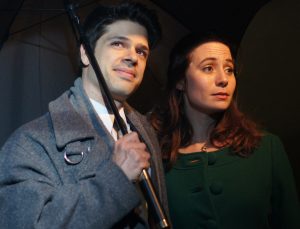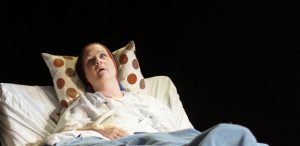ion’s ‘Kin’ Works Amid Cast’s and Writer’s Due Diligence
ion theatre company executive artistic director Claudio Raygoza is the stated man in charge of Kin, latest entry in the group’s Off-the-Radar series (he’s assisted by Julio Jacobo) — but in a pre-show speech on media day, he was quick to define his role. The cast, he said, was all in for mounting Bathsheba Doran’s stream-of-consciousness regional premiere on modern relationships, such that he found himself more an adviser and consultant on this one. The personnel, after all, are ion Actor Academy students and alums; in the interest of the authentic learning experience (and amid the substantial success of the academy’s launch last summer), any wise director (which Raygoza certainly is) would have left his peeps to their own devices.
Accordingly, the stars generally do align for this show. There’s absolutely no mistaking the cast’s first-day-at-school enthusiasm for the project, and Raygoza’s time in area educational circles may have helped fuel it in a small way. Meanwhile, Doran’s got a nice device going, as the two principals are rarely seen together while we parse out the lives and times of the subtext characters closest to them. Their speech is often oddly rhetorical and a little too self-explanatory, and I think I know why – in any event, Doran makes a telling case for their unlikely places in the relationship between the two principals.

There’s so much more to the relationship between Sean (Evan Kendig) and Anna (Rhianna Basore) — and all our relationships, in fact — than meets the eye. Courtesy photos.
If you know what an ellipsis is (…), you already know a lot about Anna, an English professor at Columbia. She’s written a herkin’ book on the many facets of punctuation as used by Romantic London poet John Keats; her fixations on the topic and culture have led her into the unlikely arms of Sean, an Irish immigrant and personal trainer. The two connect, disconnect and reconnect over seven years, even as the people around them color Anna’s and Sean’s lives with theirs.
There’s eccentric, spooky-kooky Helena, a self-styled actor and a caricature of grief amid her dog’s death a year earlier; Sean’s mother Linda, whose crippling fears are explained in a wonderful scene near play’s end; Rachel, Anna’s ex-BFF whose hold on Sean never quite relinquishes; Adam, Anna’s military dad who amid his absences never quite forged a father-daughter bond; and others who command varying degrees of face time and interest.
Indeed, we learn, we’re all kin in the most authentic sense…
Doran’s writing has a plainspokenness about it as this web of relationships spirals; it’s as if she’s taking great care not to betray too awfully much about the characters lest their lives eclipse those of Anna and Sean in the process. Her restraint is admirable – still, it fuels a double-edged sword amid the lack of descriptiveness and anecdote (“It’s so long I’ve been in a relationship, I’ve forgotten what it’s like”); (“I ask her questions; she just says she doesn’t wanna talk about it”); (“Jesus Christ, say something; don’t just stand there and watch me die”).
Then, without warning, comes the exception to the rule – elderly Linda’s eloquent confession on the hideous trauma that defined her life. Indeed, we learn, we’re all kin in the most authentic sense, our lives integral to those who forge romantic bonds.
Evan Kendig’s Sean and Rhianna Basore’s Anna work nicely as far as they go, but sometimes I wished they could have stepped into each other’s skin (Kendig’s Sean is a rather button-down sort, while Basore’s Anna has a hungry eye, and these traits would have suited the opposite character pretty well). Adam’s military background fuels his gruff exterior, and Donal Pugh acts accordingly, if a bit overeagerly for ion’s modest floor.
Elaine Litton captures Linda’s mousiness, and she underacts beautifully as Linda comes clean. Kathi Copeland’s illness-riddled, hospitalized Kay bears a breathtaking resemblance to Charles Manson acolyte Susan Atkins, who died in 2009 amid reports of terminal cancer. And as Helena, Hannah Logan pulls out as many stops as she needs, her character’s flightiness defining her colossal resistance to the process that is life. The tech effort is fluid and fine, punctuated by Raygoza’s intelligent use of graphics.

Kathi Copeland’s Kay serves up some powerful words of wisdom from her deathbed.
Here’s a formula that might clarify Doran’s sometimes questionable approach: As you experience the speeches, listen for the questions in particular. You’ll note that a good half of them are rhetorical in nature, suggesting that Doran is trying to overexplain her characters wherever she can in an abbreviated period of time. But I’ll give her a pass here, basically because her rhetoric isn’t necessarily flagrant (and also because I’m an exceptionally nice guy at heart). The cast’s enthusiasm may seem to dampen a bit under the simplistic dialogue, but that’s certainly no fault of theirs. Good show.
This review is based on the media opening of March 14. Kin runs through April 4 at BLK BOX @ 6th&Penn, 3704 Sixth Ave. in Hillcrest. $25. iontheatre.com, 619-600-5020.

Martin Jones Westlin, principal at editorial consultancy Words Are Not Enough and La Jolla Village News editor emeritus, has been a theater critic and editor/writer for 25 of his 47 years…
More…


